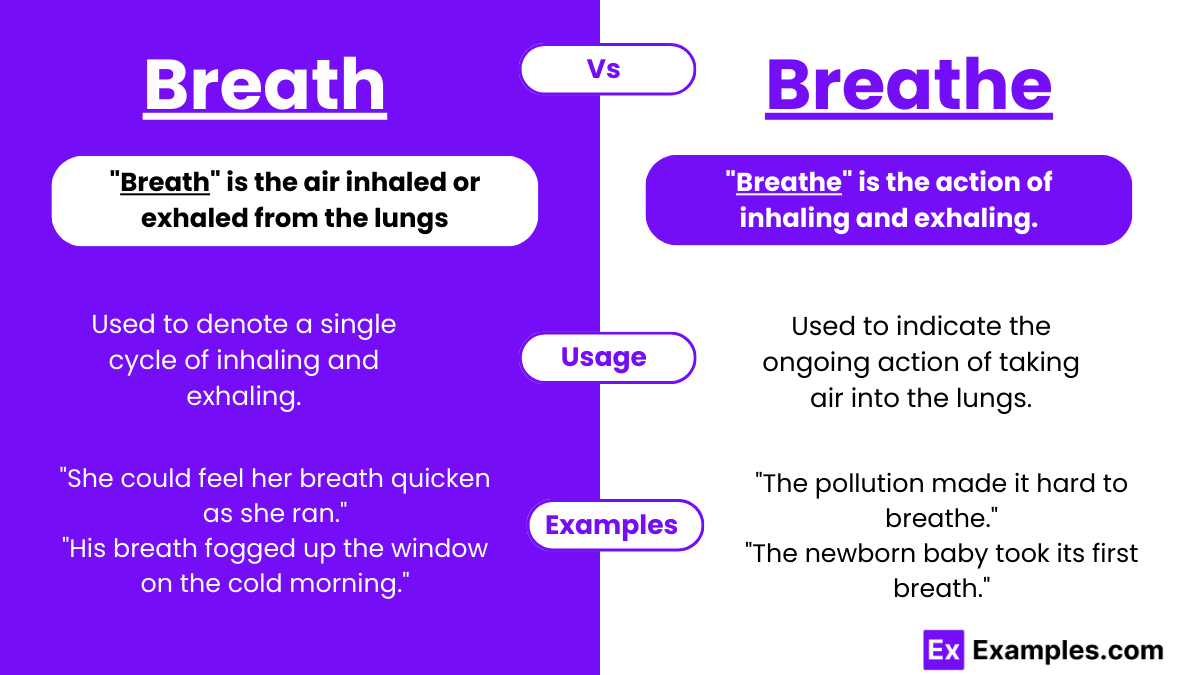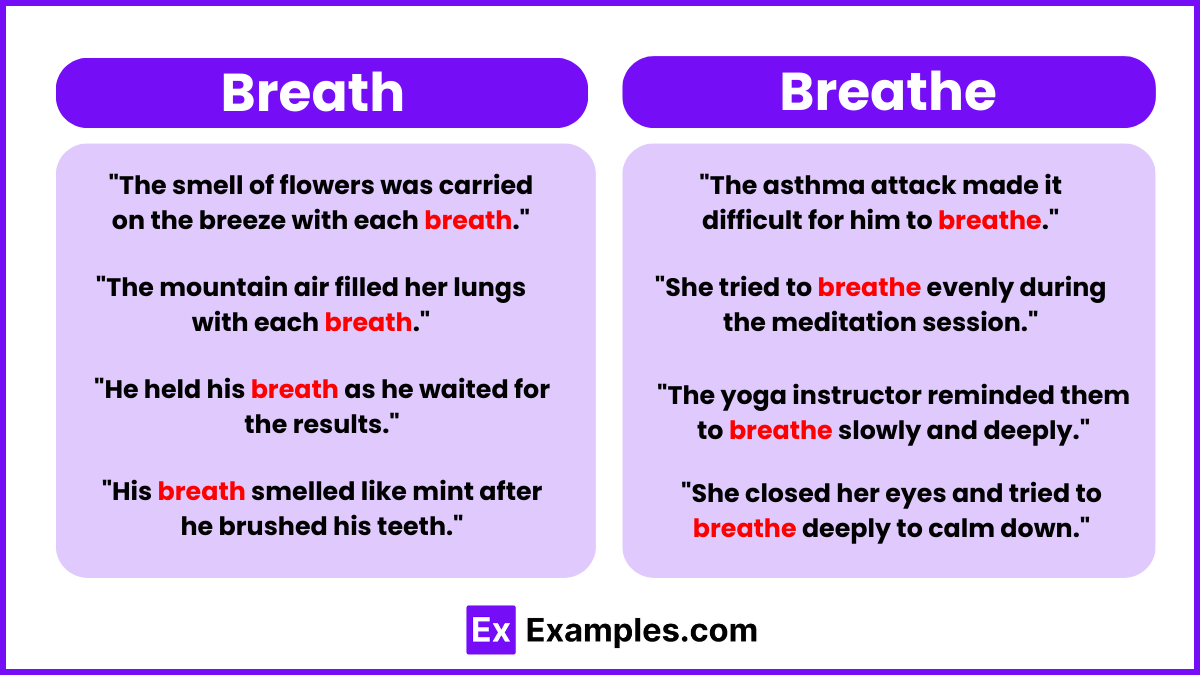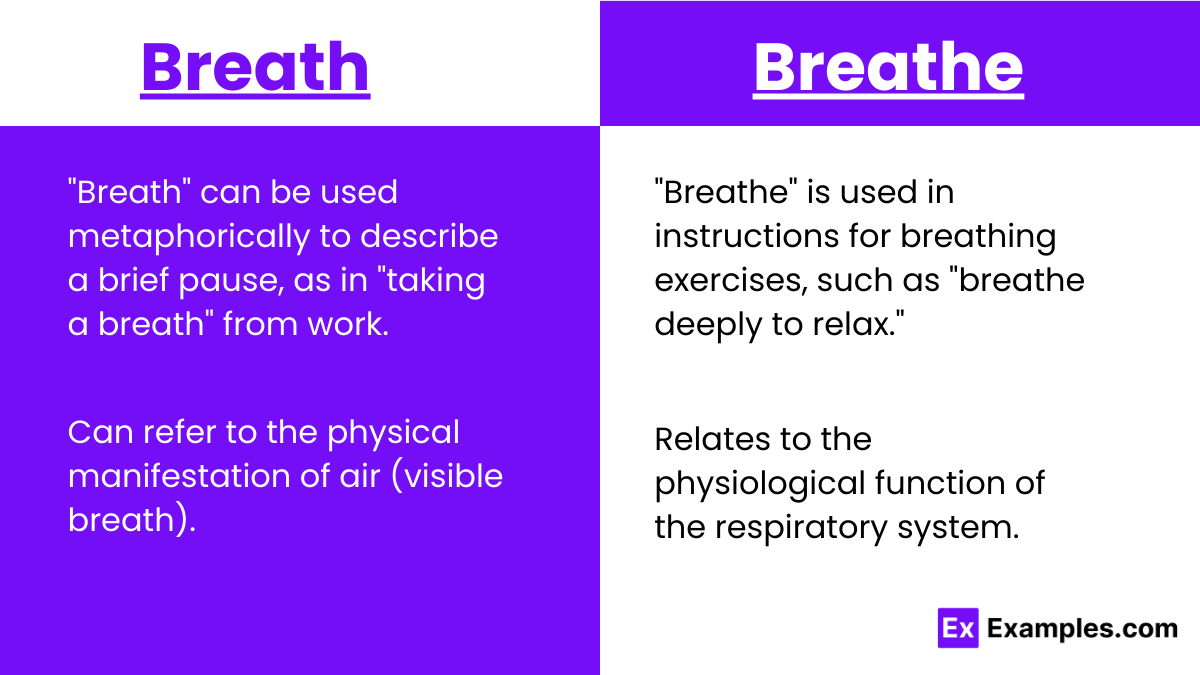Breath vs Breathe – Meaning, Differences, Examples, Usage, Tips, PDF
A linguistic journey to decipher the subtle yet significant differences between “breath” and “breathe” is essential for students and language enthusiasts alike. These closely related terms, differentiated by a mere letter, play pivotal roles in the English language, each serving a unique function. “Breath,” a noun, encapsulates the essence of life’s rhythm through the act of inhaling and exhaling, a fundamental cycle we often overlook. It’s the invisible force we witness on a frosty morning, manifesting as a fleeting cloud of warmth in the chill air. This exploration seeks to illuminate the nuanced distinctions, ensuring clarity and precision in usage.
On the flip side, “breathe,” a verb, animates the process that sustains life, inviting a deeper understanding of its application beyond its physiological necessity. The verb extends its reach into idiomatic expressions, enriching the language with phrases that reflect the breadth of human experience. The convergence of “breath” and “breathe” within linguistic expressions underscores their interrelatedness, yet their interchangeability is a common pitfall. This article aims to unravel these intricacies, offering insights into the correct utilization of “breath” and “breathe,” thereby enhancing linguistic competence and confidence among students.
Breath and Breathe – Meanings
Breath: “Breath” is a noun that signifies the air taken into or expelled from the lungs during breathing. It symbolizes a single cycle of inhaling and exhaling, serving as a fundamental sign of life and vitality. The term can also refer to a slight breeze or a small amount of something, such as in the phrase “a breath of fresh air.” In its essence, “breath” encapsulates the physical and often metaphorical element that sustains life, representing both the act and the momentary pause that breathing entails.
Breathe: “Breathe,” in contrast, is a verb that describes the act of taking air into the lungs and then expelling it, a process vital for life and respiration. It encompasses more than the mere physical act, extending into expressions of relief, life, or creation, as in “to breathe new life into something.” The verb can also be used figuratively to convey a sense of living or existing, particularly in phrases like “to breathe easily” or “to breathe a sigh of relief.” In its broader application, “breathe” signifies the continuous, dynamic process of engaging with life’s essential rhythm.
Summary
The distinction between “breath” and “breathe” is crucial for clear communication. “Breath,” a noun, encapsulates the air involved in a single act of breathing, symbolizing both the inhalation and exhalation that sustain life. On the other hand, “breathe” is a verb, denoting the ongoing action of drawing air into the lungs and releasing it, a vital process for life. These terms are not only foundational in discussing respiratory functions but also enrich language through their incorporation into various idioms and expressions. The visual of seeing one’s breath in cold air highlights “breath” as the visible manifestation, whereas “breathe” refers to the action itself.
How to Pronounce Breath and Breathe
- Breath: Pronunciation: /brɛθ/. The word “breath” ends with a soft “th” sound, as in “thin” or “thank.” It’s a shorter, clipped sound, with the “e” pronounced like the short “e” in “bet.”
- Breathe: Pronunciation: /briːð/. “Breathe” features a long “ee” sound, similar to “see” or “free,” and ends with a voiced “th” sound, as in “this” or “that.” The word is pronounced more elongated compared to “breath.”
Difference Between Breath and Breathe
Understanding the subtle distinction between “breath” and “breathe” is crucial for their correct usage in language.
| Aspect | Breath | Breathe |
|---|---|---|
| Part of Speech | Noun | Verb |
| Definition | Refers to the air inhaled or exhaled during breathing. | Describes the act of inhaling and exhaling air. |
| Pronunciation | /brɛθ/ | /briːð/ |
| Ending Sound | Has a soft “th” sound, similar to “bath.” | Ends with a voiced “th” sound, like “bathe.” |
| Usage | Used to denote a single cycle of inhaling and exhaling. | Used to indicate the ongoing action of taking air into the lungs. |
| Examples | “He took a deep breath.” | “She learned to breathe deeply.” |
| Related Terms | Breathlessness, breathalyzer. | Breathing, breathes, breathed. |
| Idiomatic Expressions | “A breath of fresh air.” | “Breathe new life into something.” |
| Function | Often signifies a moment or pause. | Implies a continuous process or action. |
| Physical Aspect | Can refer to the physical manifestation of air (visible breath). | Relates to the physiological function of the respiratory system. |
How to Remember the Difference between Breath and Breathe
To remember the difference between “breath” and “breathe,” consider these tips:
- Short and Long: “Breath” is a short word, just like a single breath is a short action. “Breathe” is longer, like the continuous process of breathing.
- “E” for Action: The “e” at the end of “breathe” can remind you it’s a verb, suggesting action. Verbs often indicate action, and breathing is an action.
- “A” and “E” Sounds: Associate the “a” in “breath” with the “a” sound in “cat,” short and quick. The “ee” in “breathe” is like the longer, drawn-out sound in “tree,” mirroring the longer action of breathing.
- Visual Cue: Imagine seeing your breath in cold air; that visible puff is a “breath.” For “breathe,” picture someone doing yoga, focusing on the long process of inhaling and exhaling.
- Rhyme to Remember: Create a simple rhyme: “With breath, you take one, it’s quick and then done. But breathe in and out, that’s what breathing’s about.”
Examples of Breath and Breathe
Examples of Breath:
- After running, he took a deep breath to calm himself.
- The cold morning air filled her lungs with a refreshing breath.
- He held his breath underwater for nearly a minute.
- A single breath of that toxic air could be harmful.
- The doctor checked the patient’s breath for any signs of distress.
Examples of Breathe:
- Learning to breathe properly can enhance relaxation and reduce stress.
- During meditation, she focused on her ability to breathe deeply.
- If you can’t breathe through your nose, try opening your mouth slightly.
- Plants breathe in carbon dioxide and release oxygen.
- He struggled to breathe after climbing the steep hill.
When to Use Breath and Breathe
Usage of “Breath”:
- Referring to a Single Inhalation or Exhalation: Use “breath” when talking about one instance of taking air into the lungs and then releasing it.
- Describing the Air Itself: “Breath” is used when referring to the air that has been inhaled or exhaled, especially visible in cold weather.
- In Idiomatic Expressions: Use “breath” in phrases like “a breath of fresh air” to denote something refreshing or invigorating.
- Talking About a Short Pause or Break: “Breath” can be used metaphorically to describe a brief pause, as in “taking a breath” from work.
- When Discussing Breath-Related Conditions: Use “breath” in the context of breathlessness, bad breath, or when using devices like a breathalyzer.
Usage of “Breathe”:
- Describing the Action of Inhaling and Exhaling: Use “breathe” when you’re talking about the process of taking air into the lungs and expelling it.
- In the Context of Life or Vitality: Use “breathe” when discussing something that is alive or has life breathed into it, as in “breathe new life into.”
- When Advising on Relaxation Techniques: “Breathe” is used in instructions for breathing exercises, such as “breathe deeply to relax.”
- Referring to the Ability or Capacity to Inhale and Exhale: Use “breathe” when talking about the capability or act of breathing, like “I can’t breathe.”
- In Expressions About Ease or Difficulty in Living: Use “breathe” in phrases like “I can finally breathe easy” to indicate relief or freedom from difficulty.
How to Use Breath and Breathe
How to Use “Breath”:
- Referring to the Act of Breathing: Use “breath” when talking about the process of inhaling and exhaling, such as “He took a deep breath.”
- Describing a Pause or Rest: “Breath” can signify a short pause, as in “Let’s take a breath before we continue.”
- Expressing Relief or Freshness: Utilize “breath” in idiomatic expressions like “a breath of fresh air,” which implies relief or newness.
- Indicating a Small Amount: Use “breath” to refer to a slight indication or trace, for example, “There wasn’t a breath of wind.”
- Physical Manifestation: “Breath” can also describe the visible condensation of breath in cold air, as in “You could see his breath in the cold.”
How to Use “Breathe”:
- Describing the Physical Process: Use “breathe” when referring to the act of taking air into the lungs and expelling it, like “Remember to breathe deeply.”
- Indicating Life or Vitality: “Breathe” can imply life or essence, as in “This garden breathes new life into the neighborhood.”
- Instructing Relaxation or Calm: Utilize “breathe” in commands or advice to relax, such as “Just breathe and count to ten.”
- Figurative Use for Ease: “Breathe” is used figuratively to suggest ease or relief, like “You can breathe easy now, the danger has passed.”
- Symbolizing Freedom or Space: Use “breathe” to indicate the need for space or freedom, for example, “The open road lets me breathe.”
Tips for Breath and Breathe
Here are some tips to help you remember how to use “breath” and “breathe” correctly:
- Noun vs. Verb: Remember, “breath” (without the “e” at the end) is a noun, referring to the air that’s inhaled or exhaled. “Breathe” (with an “e” at the end) is a verb, meaning the action of inhaling and exhaling.
- One Moment vs. Continuous Action: Think of “breath” as a single instance, like taking one breath. “Breathe” is a continuous action, something you keep doing.
- “E” for Extension: The “e” at the end of “breathe” can remind you that it’s the extended, ongoing version of “breath.” The action of breathing extends over time.
- Sound It Out: Pay attention to the final sounds. “Breath” ends with a soft “th” sound, similar to “math.” “Breathe” ends with a “z” sound, like in “these.”
- Context Clues: Look at the context of the sentence. If it describes an action, you’ll likely need the verb “breathe.” If it talks about a single cycle of air or a short pause, “breath” is your word.
- Rhyme Reminder: “Breath” rhymes with “death,” both are nouns and end similarly. “Breathe” doesn’t rhyme with “death,” indicating it’s a different part of speech.
Synonyms for Breath and Breathe
Here’s a table of synonyms for “Breath” and “Breathe” to help expand your vocabulary:
| Breath (Noun) | Breathe (Verb) |
|---|---|
| Inhalation | Inhale |
| Exhalation | Exhale |
| Respiration | Respire |
| Gasp | Draw in air |
| Sigh | Pant |
| Puff | Blow |
| Whiff | Ventilate |
| Draught | Oxygenate |
| Breath of air | Take a breath |
| Lungful | Huff |
Exercise
Fill in the blank with the correct form of “Breath and Breathe”:
- After running a mile, she had to stop to catch her ______.
- If you’re feeling anxious, try to ______ deeply and focus on calming thoughts.
- The cold air made his ______ visible as he exhaled.
- Learning to ______ properly can significantly improve your meditation practice.
- He took a deep ______ before diving into the pool.
- In yoga, controlling how you ______ is essential to mastering the poses.
- She could hardly ______ after climbing to the mountain’s summit.
- The doctor asked him to take a deep ______ and hold it.
- When you’re in high altitudes, it can be harder to ______.
- The aroma of fresh bread was a welcoming ______ of home.
FAQs
Is It Able to Breathe or Breath?
The correct phrase is “able to breathe.” “Breathe” is a verb that refers to the action of inhaling and exhaling air. When discussing the capability to perform this action, “breathe” is the appropriate choice.
Why Do People Say They Can’t Breathe?
People say “I can’t breathe” when they’re experiencing difficulty inhaling or exhaling air, often due to physical constraints, health issues, or anxiety. It’s a way to express feeling suffocated or in need of air.
When I Talk I Don’t Breathe?
Saying “I don’t breathe when I talk” refers to the common issue of not pausing to take breaths while speaking. This can lead to running out of air and feeling breathless, highlighting the importance of breathing control during speech.
Is It Everyone Held Their Breath or Breaths?
The correct phrase is “everyone held their breath.” “Breath” here refers to the collective anticipation or pause of a group, treated as a single act by each individual, hence “breath” is singular in this context





